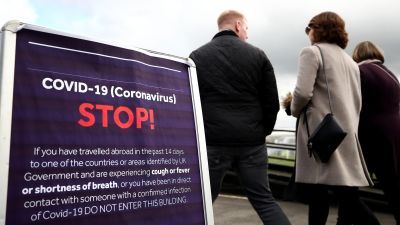Low-paid workers to receive £13 a day for self-isolating - so how will they qualify?

Video report by ITV News Correspondent Stacey Foster
The government has confirmed it will compensate those who have to self isolate with payments of up to £182.
It comes as officials will meet on Thursday to decide whether local lockdowns should continue in England.
The next announcement on restrictions in parts of Greater Manchester, east Lancashire and west Yorkshire is due to take place after a meeting of the Joint Biosecurity Centre (JBC), chaired by Health Secretary Matt Hancock and England’s chief medical officer Professor Chris Whitty.
Last week Mr Hancock announced a more targeted approach to restrictions, in which the views of MPs would also be sought to gain "the maximum possible local consensus".
People living in specific wards in Pendle and Blackburn in Lancashire, along with the borough of Oldham, Greater Manchester, were told not to socialise with anyone outside their household from midnight on Saturday, and only to use public transport if essential.
So how does this compensation for self-isolation work?
Health Secretary Matt Hancock confirmed that as of Tuesday September 1, people on either Universal Credit or Working Tax Credit, who are required to self-isolate and are unable to work from home, in areas with high incidences of Covid-19, will benefit from a new payment scheme.
Who is eligible?
People who test positive for the virus, who are on Universal Credit or Working Tax Credit, will receive £130 for their 10-day period of self-isolation, however at the moment this is only in areas Blackburn with Darwen, Pendle and Oldham - where the trial starts.
Other members of their household, who under the current rules have to self-isolate for 14 days, will be entitled to a payment of £182.
What has the government said about the quarantine payment?
When quizzed on whether the payments - representing £13 a day - were enough to live off, Mr Hancock said they were "in addition" to other benefits people on low income receive.
The Health Secretary told ITV News the payments were "at the level of statutory sick pay" but added it would be monitored.
"What really matters is that the combination of NHS Test and Trace and the local lockdowns is working to get the number of cases coming down in the most affected parts of the country," he said.
How has the Labour Party reacted?
Anneliese Dodds, Labour’s shadow chancellor, said: "Labour has been warning for months that the government needs to make sure that people can afford to do the right thing, but once again ministers have taken far too long to realise there’s a problem."
She added: "It’s concerning that this will only apply to a limited number of areas with high rates of Covid-19."
"The instruction to self-isolate applies to everyone in the country, so everyone should get the support they need to self-isolate."
The Mayor of Greater Manchester, Andy Burnham, said: "I am pleased they have at last acknowledged this issue but am sorry to say this move goes nowhere near far enough."
Mr Burnham added: "The Health Secretary has already said that he couldn’t live on Statutory Sick Pay (SSP) at £95 a week. So how can an announcement like this work?"
"For many workers in Greater Manchester, this will not provide the support people need to cooperate with NHS Test and Trace."
Meanwhile, the leader of Kirklees Council in West Yorkshire said the restrictions in place are "confusing" and urged the Government to lift restrictions for the whole of Kirklees.
Shabir Pandor said: "My position is clear, these restrictions are confusing and are not working."
"We can bring our rates down without them in place. We understand our communities and we will continue with the great work we’re doing on the ground to target areas in Kirklees with higher rates, making sure people have all the information and support they need to stay safe and prevent infection.
“The current restrictions are keeping us from visiting our friends and families in a safe way.
“How is it right that you can go to a pub or restaurant that is full of people you don’t know, but you cannot visit a relative in their garden?”